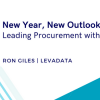As regulations and consumer pressures shift and organisations are increasingly exposed to risk – reputational and beyond – the procurement industry faces a critical juncture. This dynamic has created a business environment where sustainable procurement programs are no longer just nice to have, but an integral organisational function that is responsible for protecting and improving brand reputation, driving revenue and mitigating business risk.
Almost all organisations (97 per cent) place a high level of importance on sustainable procurement, according to the results of the 2017 Sustainable Procurement Barometer, recently released by EcoVadis and HEC Paris. The data, compiled through a survey of supply chain professionals around the world, shows an upward trajectory of the emphasis on sustainable procurement, building on the momentum of industry successes over the past ten years.
As the demand for increased transparency and reporting to public and private stakeholders has grown, so too has the motivation to put solid programs in place that will help identify, monitor, and improve the sustainability of suppliers. Forty-five per cent of organisations in our study say their sustainable procurement program covers the majority (75 per cent or more) of their supplier base today - this is a major jump from 27 per cent when the survey was last conducted in 2013.
Despite continued success, challenges remain
While sustainable procurement programs are more integral and widespread than ever before, depth of supplier visibility is still an area companies need to address. Only 15 per cent of organisations said they have complete visibility into CSR and sustainability performance of both tier-one and tier-two suppliers, and only six per cent report having full visibility into tier-three suppliers and beyond. Beyond supply chain visibility challenges, the top issues holding sustainable procurement programs back are:
- Lack of internal resources (57 per cent),
- Difficulty tracking supplier sustainability performance (37 per cent), and
- Cost concerns (33 per cent)
These results paint a vastly different picture than those from 2013, when the number-one internal obstacle cited was the lack of executive and board support – a challenge that didn’t even crack the top three this year.
Bottom-line results: Why the C-suite hopped on board
Across all areas measured, companies saw positive results after making sustainable procurement a key part of their business - from improved brand reputation and stronger supplier relationships to improved green rankings and increased revenue. In fact, 50 per cent of sustainable procurement leaders said they have increased revenue from the sustainable and innovative products they have sourced, a 33 per cent increase over non-leaders.
Over the past 10 years, Fortune 500 organisations around the world continued to invest heavily to ensure sustainability and CSR are ingrained across all aspects of their supply chain and procurement operations. The priority now – especially for Chief Procurement Officers and Chief Sustainability Officers – is to scale programs and ensure the investment pays off, achieving the desired impact across the supply chain.
One great example is IKEA, which recently acquired a minority stake in Morssinkhof Rymoplast, a Dutch plastic recycling company, as part of its $1 billion sustainable supply chain investment. While many factors likely played into IKEA’s investment – including its sustainability mission – three business drivers stand out:
- Risk management, accomplished by ensuring they have a long-term, sustainable supply of materials and products to avoid sales disruptions;
- Cost prediction, accomplished by gaining more control over the supply and demand of their products; and
- Differentiation, accomplished by improving the value of the brand for end consumers by being positioned as a leader in sustainable products and business practices
With the right tools, executive support, and supplier engagement, every organisation can make the shift toward sustainable procurement. But to fully drive ROI and value creation requires much higher coverage, and getting the rest of the organisation – procurement, supply chain, risk management, EH&S - to adopt sustainable procurement in their daily jobs. Our research made one takeaway clear above all else: there’s no time to waste. The industry is changing rapidly, and those that forgo opportunities to vet both existing and potential suppliers will put themselves at a major disadvantage for years to come.
About the Author Pierre-Francois Thaler is Co-founder and Co-CEO of EcoVadis, a supplier rating company that helps organizations institute corporate social responsibility (CSR) and various sustainability programs. Pierre brings 15 years of experience in procurement and developing innovative sourcing solutions. Prior to starting EcoVadis, Pierre was CEO of B2Build SA the first B2B marketplace for the European construction industry, and also served as a director of Ariba’s Procurement BPO business.







